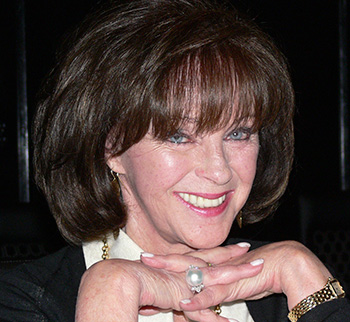TORONTO — Malka Green, a woman who touched countless people through her passion for philanthropy, Jewish community leadership and the arts, as well as through her kindness, compassion and grace, died late last month after a brief battle with cancer.
Just three weeks before she died on June 21, Green, 74, was diagnosed with late-stage pancreatic cancer.
Until then, Green dedicated her time and resources to non-profit organizations that promoted the interests of both the Jewish and the non-Jewish community, and the arts community.
“She strongly believed in leaving things better than when you found them,” said Andrew Himel, her oldest son.
With her husband, Abraham (Al) Green, she was co-director of the Al and Malka Green Foundation, which is dedicated to supporting health, the arts, human rights and tolerance.
She was a director of the Mount Sinai Hospital Auxiliary, a founding director of operations at the University of Toronto Art Centre, and founding director of the State Hermitage Museum Foundation of Canada, which introduced Canadian art to Russia and promoted Russian culture in Canada.
In addition to providing generous funding to the University Health Network, the Art Gallery of Ontario, United Way and UJA Federation of Greater Toronto, Green was also one of the founding directors of the Friends of Simon Wiesenthal Center for Holocaust Studies in Toronto.
“‘Malkie’ was an angel – an eshet chayil – a bedrock of the organization. She was a woman of class and distinction who was ever positive and wise. We will miss her greatly,” said Avi Benolo, president and CEO of Friends of Simon Wiesenthal Center.
Tennys Hanson, president and CEO of Toronto General & Western Hospital Foundation, said she came to know Green about 15 years ago when they founded the Al & Malka Green Artists’ Health Centre at Toronto Western Hospital. “Malka was the very epitome of gracious and kind… She was an elegant woman, soft-spoken and interested in what others thought… She had a sincere concern for helping those who were less fortunate,” Hanson said.
“She loved the arts,” said Alison Himel, Green’s daughter. “She did like being able to donate money. That was really important to her, and she and Al were great that way because they shared that value.”
Anna Shternshis, acting director of the Anne Tanenbaum Centre for Jewish Studies and the Al and Malka Green Associate Professor in Yiddish Studies, said she’s grateful to the Greens for their support of Yiddish culture. “I am very grateful to this family, as their generosity enabled the professorship in Yiddish Studies at U of T, the only chair in Yiddish in Canada, and one of the very few in the world. Thanks to Al and Malka Green, Yiddish will always be taught at the University of Toronto, which ensures its future in and out of the academic world.”
Green’s son, Andrew, said beyond her contribution to the community, as a mother, she instilled in her children an understanding of the importance of tikkun olam.
“She had very good, solid values and she had a lot of compassion for people who were suffering. She knew suffering in her life. Her mother, my grandmother, died when she was around 45, and that obviously had a profound effect on my mom. Her father, my grandfather, died of ALS, so she had many loved ones who had prolonged suffering, and I think my mom was an extremely compassionate person,” he said.
Green “had the graces,” her daughter said, but there was a side to her that only those closest to her got to see.
“There was the outside persona, and the whimsical, curious, mischievous person that her good friends knew but that the public probably didn’t,” Himel said.
“What would surprise people is how much she loved her sweets because she was always so skinny,” she said with a laugh. “That would surprise people – how much she loved her ice cream or a good burger.”
Himel said in the weeks since her mother’s passing, she’s been touched by stories about how she was able to pick people up when they were down.“People say, ‘At my lowest moment, she touched me, or she always came in with a smile, or flowers,’ and I hear stories about people who just got up from shivah and she had cupcakes delivered – just something to bring a smile to someone’s face,” she said.
“They gave a lot to the city, but she was just a very nice, classy lady,” Andrew said. “She was very beautiful… she had a certain charm and charisma, and a genuine kindness and aura about her. She was the whole package… I’m lucky that she was my mom.”
